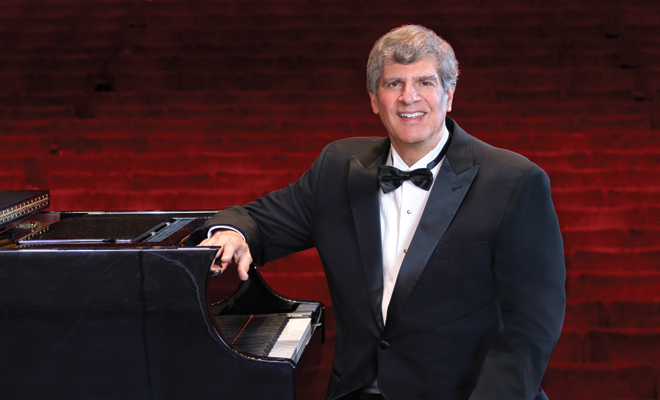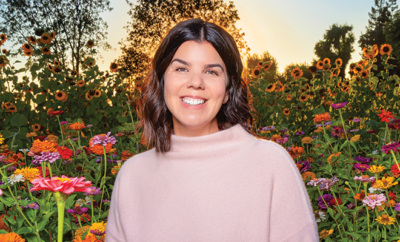
Stockton Symphony: “In the end, there will always be music.”
Photos by Caroline Photography and Courtesy of Francesca Vera and the Stockton Symphony
In the beginning, there was music. From the very first melodies sung around ancient campfires to the songs on today’s Top 100 chart, music accompanies humanity’s past, present and future. In the face of tragedy and grief, musicians play on, bringing people together and overcoming barriers. Music is a source of joy and celebration, of solace and strength.
Music is also a keystone of Stockton’s history. The Stockton Symphony is California’s third-oldest continuously operating professional orchestra, from its inaugural season in 1926 to the present day. The group has continued to play through major upheavals and historical events, and in 2026, it will celebrate its 100th year. The upcoming centennial is a testament to both the symphony’s caliber and its lasting impact on the local community.
Coast to Coast: Italy to California
If you happened to wander into an Italian café in the late 19th century, you might have heard music–perhaps a piccolo, a violin, or a cello–played by a small boy and his brother. Manlio Silva grew up in Chiavari, by the sea in Genoa, Italy, and often played for the community with his younger brother, Tullio. The two of them were dedicated musicians. For Manlio and his family, music was not simply a hobby or a pastime: it was a way of life. Wherever they went, whatever they were doing, music followed them.
Manlio graduated from the Conservatory of Chiavari and in 1909, he immigrated with his brother to the United States to attend pharmacy school in San Francisco, trading the Mediterranean coasts for the rocky beaches of the bay area. As he studied, the cosmopolitan music scene of San Francisco fueled Manlio’s love of music, inspiring him with its world-renowned symphonic and operatic performances. He made friends with local musicians and continued to practice his own instruments, violin and piccolo, while preparing to launch his career as a pharmacist.
In 1915, Manlio opened the Genova Pharmacy in Stockton, California, with Tullio as his partner. But even as he established his career, music remained essential to his way of life. To Manlio, being a pharmacist and being a musician were two sides to the same coin; one provided medicine for the body, the other provided medicine for the soul. Slowly, he began to gather local musicians together in the hope of beginning an ensemble. And so, through the passion and perseverance of a hard-working Italian immigrant, the Stockton Symphony was created.
The Stockton Symphony gave its first performance in May 1926 with Manlio Silva at the conductor’s podium and launched its inaugural season in October of the same year at the California Theater on Main Street. Francesca Vera, Tullio’s daughter and Manlio’s niece, speaks fondly of her childhood during the early days of the Stockton Symphony. “I would walk with him to the Stockton high school auditorium where the symphonies were held on Monday nights, and I would put the music on the stands.” Music was an extended family affair. Tullio played cello for the symphony and Francesca’s cousin, Carmen, played the piano for certain performances or played one-off instruments such as the triangle. Musicians would come from Oakland, San Francisco and even New York to play with the symphony, and the revelry continued beyond the performances. “After the symphonies they had dinner parties at the house. It was a fabulous time,” Francesca said.
Manlio poured his soul into the Stockton Symphony, often paying the musicians or covering unmet expenses with his own money. “It was his dream,” Francesca said, and he did everything he could to ensure that dream would endure to bless the community for years to come. Not only did Manlio focus on preserving the classical music he’d grown up playing, but he also ensured modern musicians and compositions were given time on the stage. Francesca said, “Manlio did a lot for new musicians, new music. He was very futuristic too.”
Dedicated to his beloved symphony until the very end, Manlio Silva died on the opening night of the symphony’s season in October 1958. His legacy lives on in the community to this day, from the enduring presence of the Stockton Symphony to the local elementary school that bears his name and boasts a flourishing music program.
Furthering Manlio’s Legacy
After Manlio’s passing, Horice I. Brown stepped into the role of conductor and was followed by Fritz Berens, Ralph Matesky and Warren van Bronkhorst, who remained with the symphony for 17 years. In 1967, a new director joined the Stockton Symphony, Kyung-Soo Won, a prestigious musician and conductor with degrees from Seoul National University, Cincinnati Conservatory of Music and Indiana University. The Stockton Symphony flourished under Won’s tutelage. During his tenure, as their website proudly states, “the Symphony morphed from a community ensemble to a fully professional orchestra of ‘metropolitan’ status as recognized by the American Symphony Orchestra League.” Won also focused on bringing the symphony to the local community by playing at parks, venues and events around the Central Valley. After 27 years of dedicated service to the Stockton Symphony, Kyung-Soo Won retired in 1994 to become a professor of music at Seoul National University and conduct the Seoul Philharmonic.
After Won’s retirement, Maestro Peter Jaffe became the conductor of the Stockton Symphony and opened their season in 1995. Now, over 30 years later, Peter still stands at the podium, a commanding presence with a contagious laugh and an even more contagious passion for music. Born in New York and raised in Berkeley, Jaffe has an appreciation for the entire musical spectrum. He played in the Oakland Symphony Youth Orchestra and also was part of a garage rock band. His father was active in the folk music scene, and his mother had a deep love of ballet and the music that accompanied it, teaching her children how to read music at an early age. “They embraced everything: jazz, pop, punk, classics,” Peter said with a laugh. “And that kind of rubbed off on me. That’s why I enjoy doing the whole spectrum of what we do at the Stockton Symphony.”
Peter Jaffe attended Oberlin University for his undergraduate degrees, where he also met his wife, Jane, a phenomenal illustrator and musician in her own right, who holds a doctorate in musicology from the University of Chicago. Peter’s resume is extensive, having received his graduate training at Stanford University and conducted orchestras in locations across the United States and beyond, including the Oberlin Conservatory, Pomona College, Stanford University, the Aspen Music Festival, the Tanglewood Music Festival and more. He speaks of his past experiences with fondness and gratitude, but the conversation always turns back homeward. “Stockton is my home base, my home allegiance. I feel privileged every time I get up there and work with the symphony. My role is more as a conduit, as a servant of the music.”
The Stockton Symphony has continued to flourish under Maestro Jaffe’s expert direction. Their variety of programs appeals to all ages and tastes, from classical performances to their Holiday Pops concerts. They also offer educational resources to local schools and host the Steppin’ Out Children’s concerts for fourth and fifth graders, which teach students different aspects of musical notation and composition. True to his roots, Peter embraces both tradition and novelty, intentionally creating space for underrepresented artists. He has commissioned one or two world premieres every season and has focused on pieces by women composers Latino and African American composers, as well as performing classical pieces. For a traditional example, he said, “This past spring we did Mahler’s Second Symphony. It was a real bucket list piece for me.” Mahler’s Symphony No. 2, colloquially known as the Resurrection Symphony, is a profound piece that was particularly apt for last season as many parts of the world continued to shake off the cobwebs left by the COVID-19 pandemic.
Music Outlasts
When recounting his musical history, Maestro Jaffe noted that some of the most poignant performances were shortly after turbulent historical events. Not long after the assassination of Martin Luther King Jr., the orchestra he played with as a child performed a program of all Black composers in the deep South. He conducted symphonies in Berlin shortly after the Berlin Wall was torn down, in New Orleans shortly after Hurricane Katrina, and our own local All-American concert the weekend after 9/11. The Stockton Symphony is another example of live music persevering despite tragedy. Founded in the shadows of World War I and the Spanish flu pandemic, enduring through World War II, the Great Depression and the rest of the 20th century, the Stockton Symphony stands as sonorous evidence of something uniquely healing and uniquely human.
Some dismiss live music as an antiquated luxury, calling it non-essential and out of date. The recent cuts to the National Endowment for the Arts and other changes in national support of the arts seem to echo this train of thought, but in a world that is growing more and more divided, we must rally around the things that unite us and remind us of our common humanity. “It’s important that there be an artistic haven where people of all walks of life and all opinions can come into a concert hall and leave those opinions at the door and just bask in an inspirational and emotionally moving artistic experience,” Peter said emphatically. Scott Watkins, Stockton Symphony’s current executive director, agreed. “Music has the ability to bring people together and remember that we’re human. I alwdays go back to music to remind myself why I do what I do.”
The Stockton Symphony is just such a healing presence in our local community. It’s “a gem, an incredible organization,” as John Zieter, a lifelong supporter, said. He is evidence that non-musicians can enjoy the symphony as much as lifelong musicians: he insists that “it’s a part of my life even more because I can’t play an instrument myself.” Live performance brings people together, in the park or school or grand auditorium, playing Beethoven or the Beatles, all ages, all backgrounds, all cultures.
As the Stockton Symphony prepares for its centennial celebration, it also prepares for the decades to come. The future might be more tenuous than it has been in years past, but they also know a truth that Francesca Vera put in two simple words: “Music outlasts.” With the community’s support, the Stockton Symphony will be there to support the community. Whatever triumphs or tragedies might be awaiting us in the course of history, it will remind us–as Mahler’s Second Symphony so powerfully sings–that we will “rise again, yes, rise again.”
Because in the end, there will always be music.










